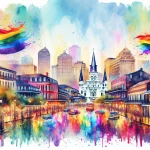New Orleans is a captivating city with a storied cultural legacy that draws millions of visitors yearly. From its world-famous cuisine and lively music scene to its historic architecture and annual festivals, the city offers a unique experience for all. However, for individuals who are deaf or blind, navigating New Orleans can present significant barriers. Fortunately, the city has an extensive network of resources and services dedicated to ensuring that everyone, regardless of disability, can fully enjoy all that New Orleans has to offer.
In This Article
TL;DR
- New Orleans provides a wide array of services and support systems for the deaf and blind communities, including specialized transportation, accessible attractions, and assistive technologies.
- Organizations like Lighthouse Louisiana and the Louisiana Deafblind Project play pivotal roles in offering education, employment support, and recreational activities for individuals with hearing and vision impairments.
- Innovative initiatives, such as the Recite Me web accessibility toolbar and the RTA Accessibility Cards, aim to enhance accessibility and inclusivity for the deaf and blind communities in New Orleans.
Understanding Accessibility in New Orleans
Overview of Accessibility Challenges
Individuals who are deaf or blind often face numerous accessibility challenges in urban environments, including navigating crowded streets, accessing public transportation, and finding inclusive recreational activities. In New Orleans, these challenges are compounded by the city’s unique geography and infrastructure. The historic neighborhoods, with their narrow streets and uneven sidewalks, can be particularly difficult for those with mobility or visual impairments.
Key Organizations and Their Roles
Several organizations in New Orleans are dedicated to serving the deaf and blind communities, providing a wide range of services and resources to help individuals overcome accessibility barriers and fully participate in all aspects of city life.
Lighthouse Louisiana is a prominent organization that offers a variety of services to individuals of all ages who are blind, visually impaired, or have other disabilities. Their services include orientation and mobility training, assistive technology assessments, and social support groups. Additionally, Lighthouse Louisiana operates a visual aids store, providing magnifiers, braille playing cards, and other specialized products.
The Louisiana Deafblind Project, run by the LSU Human Development Center, is another crucial resource for children and youth with varying degrees of hearing and vision loss. The project provides technical assistance, training, and family support services to ensure that these individuals receive appropriate education and support.
Navigating the City: Resources for the Deaf and Blind
Transportation Services
Accessible public transportation is essential for individuals with disabilities to navigate New Orleans independently. The Regional Transit Authority (RTA) operates buses, streetcars, and ferries equipped with devices for disabled riders, such as ramps and audio/visual announcements. Additionally, the RTA offers paratransit services for eligible riders who cannot use the fixed-route system.
In partnership with Lighthouse Louisiana, the RTA provides Accessibility Cards for riders who are blind, deaf-blind, or have low vision. These color-coded cards can be used to communicate needs to operators and drivers, making the public transportation experience more accessible and inclusive.
Accessible Attractions and Activities
New Orleans is home to numerous attractions and activities that cater to visitors with disabilities. The National WWII Museum, for example, offers large-print visitor guides, sound-amplifying devices, and staff members trained in American Sign Language (ASL). Similarly, the Ogden Museum of Southern Art provides large-print materials and verbal description services for visitors with visual impairments.
For those interested in live performances, the Saenger Theater and the Broadway in New Orleans series often offer live interpreters during select shows, ensuring that deaf and hard-of-hearing patrons can fully enjoy the experience.
Education and Employment Resources
Ensuring access to education and employment opportunities is crucial for individuals with disabilities. In New Orleans, several schools and educational programs are tailored specifically for the deaf and blind communities.
The Louisiana School for the Deaf and the Louisiana Center for the Blind offer specialized education and vocational training programs, equipping students with the skills and resources they need to succeed academically and professionally.
Additionally, organizations like Lighthouse Louisiana provide employment resources and job placement services for individuals with visual and hearing impairments, helping them find meaningful employment opportunities and achieve greater independence.
Technology and Innovation for Accessibility
Assistive Technologies
Advancements in assistive technologies have revolutionized accessibility for individuals with disabilities. In New Orleans, various assistive technologies are available to support the deaf and blind communities.
For individuals with visual impairments, screen readers, magnification software, and braille displays can enhance computer and smartphone accessibility. Those with hearing impairments can benefit from captioning services, hearing aids, and video relay services for communication.
Innovative Local Initiatives
New Orleans is at the forefront of innovative initiatives aimed at increasing accessibility for the deaf and blind communities. One notable example is the Recite Me web accessibility toolbar, which has been implemented on the New Orleans tourism website. This tool allows visitors to read website text aloud, change font sizes and colors, and translate content into various languages, making the online experience more inclusive.
Additionally, the RTA’s Le Pass app provides a convenient way for individuals who are deaf or blind to access public transportation information and plan their routes more effectively.
Community and Social Inclusion
Social and Recreational Opportunities
Beyond practical resources, social inclusion and community support are vital for individuals with disabilities. In New Orleans, various clubs, groups, and social events cater specifically to the deaf and blind communities, fostering a sense of belonging and providing opportunities for recreation and personal growth.
Lighthouse Louisiana hosts a monthly support group facilitated by a licensed social worker, offering a safe space for individuals to discuss their experiences and challenges related to vision loss. The organization also offers a “Fun 101” program, which includes interactive activities, exploration of the arts, and social gatherings for participants in vision rehabilitation programs.
Advocacy and Awareness Efforts
Local organizations in New Orleans are actively involved in advocacy and awareness efforts to promote the rights and inclusion of individuals with disabilities. These efforts aim to educate the public, challenge misconceptions, and advocate for policies and initiatives that enhance accessibility and equal opportunities.
By raising awareness and fostering a more inclusive community, these organizations are making a significant difference in the lives of individuals who are deaf or blind, ensuring that they can fully participate in all aspects of life in New Orleans.
Practical Tips for Visitors and Residents
How to Access Resources
For visitors and residents seeking to access resources for the deaf and blind in New Orleans, several organizations and services are available:
- Lighthouse Louisiana: (504) 899-4501, lighthouselouisiana.org
- Louisiana Deafblind Project: (504) 556-7506, lsuhsc.edu/ladbp
- Regional Transit Authority (RTA) Accessibility Information: (504) 827-8345, norta.com/accessibility
These organizations can provide detailed information on available services, assistive technologies, and accessibility accommodations throughout the city.
Best Practices for Engaging with the Deaf and Blind Communities
To foster an inclusive and supportive environment, individuals and businesses in New Orleans should adopt best practices when engaging with the deaf and blind communities. These practices include:
- Being patient and allowing extra time for communication
- Speaking clearly and avoiding excessive background noise when interacting with individuals who are deaf or hard of hearing
- Offering to provide written information or audio descriptions for individuals with visual impairments
- Respecting personal space and avoiding physical contact without permission
- Seeking guidance from organizations like Lighthouse Louisiana on how to create more inclusive spaces and services.
By embracing these best practices, the city of New Orleans can become a more welcoming and accessible destination for all visitors and residents, regardless of their abilities.
Enhancing Accessibility: A Look to the Future
Ongoing Challenges and Areas for Improvement
While New Orleans has made significant strides in providing resources and services for the deaf and blind communities, ongoing challenges and areas for improvement remain. Addressing these challenges will be crucial to ensuring full inclusivity and equal access for all individuals with disabilities.
One area that requires further attention is the accessibility of public spaces and infrastructure. Many historic neighborhoods in New Orleans still lack adequate curb cuts, tactile paving, and other features that facilitate navigation for individuals with visual or mobility impairments.
Additionally, there is a need for increased awareness and training among businesses and service providers to ensure that they can effectively communicate with and accommodate individuals who are deaf or blind.
Future Directions and Innovations
As technology continues to evolve, new innovations and advancements hold the potential to further enhance accessibility for the deaf and blind communities in New Orleans. For example, the integration of smart city technologies, such as accessible navigation systems and real-time information displays, could significantly improve the ability of individuals with disabilities to navigate the city independently.
Furthermore, the development of more advanced assistive technologies, such as wearable devices and augmented reality applications, could revolutionize the way individuals with hearing or vision impairments interact with their surroundings.
Importantly, the future direction of accessibility initiatives in New Orleans should be shaped by the feedback and active participation of the deaf and blind communities themselves. By involving these communities in the decision-making process and incorporating their perspectives, the city can ensure that new technologies and services truly meet their needs and enhance their overall quality of life.






